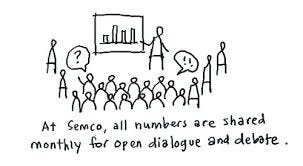
“Only in recent history has “working hard” signaled pride rather than shame.” -Nassim Taleb
Ricardo Semler is the highly successful former CEO of the Brazilian company Semco, growing it from four million in 1982 to two hundred and twelve million in 2003.
He is well-known for basing his radically democratic management style based on a theory of human nature that profoundly deviates from the image of man espoused by traditional economic theory. On this, Semler wrote the best-selling books Maverickand the Seven-Day Weekend, in which he develops advanced ideas about psychology, the role of work in modern life and leadership.
In an interview with Tim Ferriss, he shares some deep insights into what it means to win the game of life.
Having a good day
When the night dawns, by what criterion do you judge the day that now lies behind you? Was it a good day? Why (not)?
For me, productivity has always been the standard of assessment.
At the end of a day on which I read many pages, for example, I would give myself a mental pad on the back; conversely, when the relevant metrics indicated fewer output, I would be less happy with myself.
Thanks to Semler, I have come to re-evaluate this way of evaluating.

The meaning of life
Citing James Taylor’s The Secret of Life, Semler links the meaning of life toenjoying the passing of time. When all is said and done, the extent to which you managed to do that — notthe totality of to-do-list items you completed — determines whether you have had a good life.
If that’s our description of a life well-lived, it should loop back into our description of a day well-spent.
Accordingly, Semler thinks that true accomplishment is not about getting things done, but about something very different:
“Success, for me, is always making sure that the passing of time is worthwhile and that I’m not exchanging it for hope for some future or for something that I had in the past.”
This not so easy as it may seem:
“Enjoying the passing of time is by far the hardest thing we can ever do. Living in the present is very difficult.”
For Semler, one does not win the day by being productive, but by beingpresent.
Defining success
In Happier, Harvard-psychologist Tal Ben-Sahar defines the “arrival fallacy” as “the false belief that reaching a valued destination can sustain happiness”.
Such beliefs are incorrect, because evolution has tricked us and so, once we achieve a desired thing we no longer desire it. Given that human psychology works this way, viewing happiness as something you need to deserve — making it depend on reaching an aspired target — is tricky business.
There is an interesting connection between the arrival fallacy and Semler’s philosophy that success and productivity are two fundamentally distinct concepts.
Both theories point to the idea that getting to some destination or fulfilling some external metric are not as important to living well as is commonly assumed.
Hence, when some productivity-standard figures in your definition of ‘success’, you are probably chasing the wrong thing.
According to Semler, success means experiencing high-quality time, regardless of external outcomes:
“If this podcast was worth it, because it made us think — that is success. If you went to a baseball game that you enjoyed — that is success. These hours were successful because the passing of time was worthwhile.”
I never thought of enjoying a baseball game as a success, but, now that I think about it, Semler’s reasoning makes a lot of sense.
Don’t forget about your priorities
To summarize, so far we have seen that while it’s intuitive to define success aswhat you accomplish during a period of time, Semler argues that it’s better to see success as how you experience a period of time.
Consequentially, it might be wise to evaluate your days in terms of presenceand not in terms of productivity.
In today’s society, it’s easy to forget that working hard is not valuable in itselfand therefore does not by definition deserve to be prioritized over other activities.
Especially when it comes to ‘Getting Things Done’, we are very prone to slip into the “collection mode”:
“Once you start to accumulate you are caught in this collection mode, which is,you’ll always find a reason to think that you need more and fail to realize that it in fact is taking away from something, from time with your kids or time sitting in the backyard reading another book, … .”
When we slip into the collector’s mindset, we invest time in our collectionmerely for the sake of expanding it.
Nowadays, many people are collecting ‘things I got done’ and rationalize their busyness by finding a reason to think that they do in fact really, really need to complete this one more task.
We fail to realize that expanding our collection of finished chores for the sake of expanding the collection — ‘look at how productive I was today!’—is probably not very smart prioritizing.
Why not? Time allocated to productivity cannot be allocated to things that deserve time as well (other people, travel, spirituality, thinking, exercise, some hedonism, etcetera). If you find yourself setting aside more and more time to increase the amount of stuff you got done, you might have lost track of these other domains.
It’s for that reason that people like Tim Ferriss and Nassim Taleb argue thatbusyness simply means that you don’t have your priorities straight.
Regardless, time is a non-renewable resource. Therefore, we should be very conscious of why we are spending our days like we do, before it’s too late.
So ask yourself: has your large pile of finalized to-do-list items really been worth the time you invested in it or have you slipped into the collector’s mindset?
Oh, and, yes, I said ‘before it’s too late’ and it means what you think it means.
Terminal days
“Remembering that I’ll be dead soon is the most important tool I’ve ever encountered to help me make the big choices in life.” -Steve Jobs
To keep track of our priorities, Semler has one last piece of advice that comes full circle with his definition of success.
It’s so easy to switch from ‘I could do this productive activity’, to ‘I should do this productive activity’. However, we should not forget that productivity as such is not a worthwhile goal.
For this purpose, Semler schedules “terminal days”:
“On Mondays and Thursdays I only do what I would do if I had just learned that I have a terminal disease. This forces you to answer for yourself what you reallywant to do and what really moves you. I find that I’m not left with goals(something measurable to achieve), but with processes that I love and want to do again and again.”
If you would not spend some of your ‘terminal hours’ on something related to your everyday vocation, chances are you are committed to it for the wrong reasons.
This reminds me of the BBC-documentary Slomo, where the protagonist similarly re-orders his priorities after being reminded of his mortality. It also reminds me of this book, in which palliative nurse Bonnie Ware reports the most common regrets of her dying patients.
Number 1: I wish I’d had the courage to live a life true to myself, not the life others expected of me.
Number 2: I wish I hadn’t worked so hard.
If that doesn’t make you think, I don’t know what does.
When we are forced to think deeply about our priorities, productivity turns out not to be very high on the list. Yet, that is what we spend the majority of our waking hours on.
If being confronted with death causes us to spend our days
Like to read?
Join my Thinking Together newsletter for a free weekly dose of similarly high-quality mind-expanding ideas.